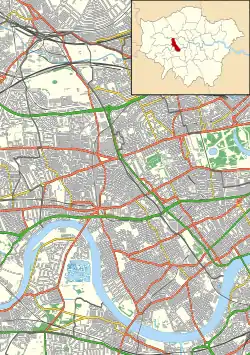Fulham Hospital
Fulham Hospital was an English hospital in the west London district of Fulham from 1884 to 1973. From 1957 onwards it was merged with the Charing Cross Hospital and gradually demolished. Charing Cross Hospital relocated from central London and now occupies the former Fulham Hospital site, south of St Dunstan's Road.
| Fulham Hospital | |
|---|---|

| |
 Location within Hammersmith and Fulham | |
| Geography | |
| Location | Fulham Palace Road, Hammersmith, London, England |
| Coordinates | 51.4871°N 0.2195°W |
| Organisation | |
| Care system | NHS England |
| Services | |
| Emergency department | Yes |
| Beds | 394 |
| History | |
| Opened | 1884 (as the Fulham Parish Infirmary) |
| Closed | 1973 |
History
The hospital started as the Fulham Parish Infirmary, built for inmates of Fulham Workhouse,[1] completed in 1848.[2] Opened in 1884, the infirmary had two doctors and 31 nurses attending to 486 patients, many of whom were chronically ill or senile. In 1905, an operating theatre was installed and a nurses' home was built.[3]
During the early part of World War I, the Infirmary cared for wounded soldiers from the First Battle of Ypres, and in 1915 was taken over by the War Office to become Fulham Military Hospital. This was expanded during the war, and by 1917 had 1130 beds.[3] Nearby Syon House and Fulham Palace[4] were also used as temporary extensions of the hospital's facilities. In 1919, the hospital, no longer required by the War Office, briefly reverted to its old name of Fulham Infirmary, but, having also been called St Christopher's Hospital, was renamed Fulham Hospital in 1928[1] (as distinct from the Fulham Hospital in Seagrave Road, which had become the Western Fever Hospital in 1885). The former workhouse became the Fulham Institution, a hospital offering 475 places for the chronic sick and aged, while the Fulham Hospital had 564 places.[3]
In 1930, administration of the hospital was taken over by London County Council, and in 1934, the hospital and Institution were merged, becoming Fulham Hospital 1 and Fulham Hospital 2 respectively. In the late 1930s the two Fulham Hospitals had 711 beds.[3]
In World War II, the Hospital received wounded soldiers from Dunkirk, and was subject to bomb damage several times.[3] Fulham Hospital 2 eventually closed, and in 1948 Fulham Hospital joined the NHS under the management of the South West Metropolitan Regional Health Board,[1] providing 394 beds.[3]
During the 1950s, the workhouse building was demolished, and in 1957 it was announced that the hospital would merge with the Charing Cross Hospital - then located around five miles to the east in central London. From the late 1950s onwards, construction of a new hospital progressed, starting initially on the site of the former workhouse and Board of Guardians offices. The Fulham Hospital was demolished in phases and finally closed in 1973, with the new Charing Cross Hospital (Fulham) opened by Queen Elizabeth II in the same year.[3] An old weathervane from Fulham Infirmary is preserved as a feature in the main garden behind the current hospital.[5]
References
- "Details: Fulham Hospital, London". National Archives. Retrieved 4 December 2018.
- "Fulham (Middlesex)". Workhouses.org. Retrieved 4 December 2018.
- "Fulham Hospital". Lost Hospitals of London. Retrieved 4 December 2018.
- Kate Clements (24 October 2014). "Find out what happened to Fulham Palace during the Great War in a new exhibition". 1914.org. Retrieved 4 December 2018.
- "Charing Cross Hospital (also known as Fulham Infirmary, Fulham Hospital)". Parks & Gardens. Retrieved 4 December 2018.
